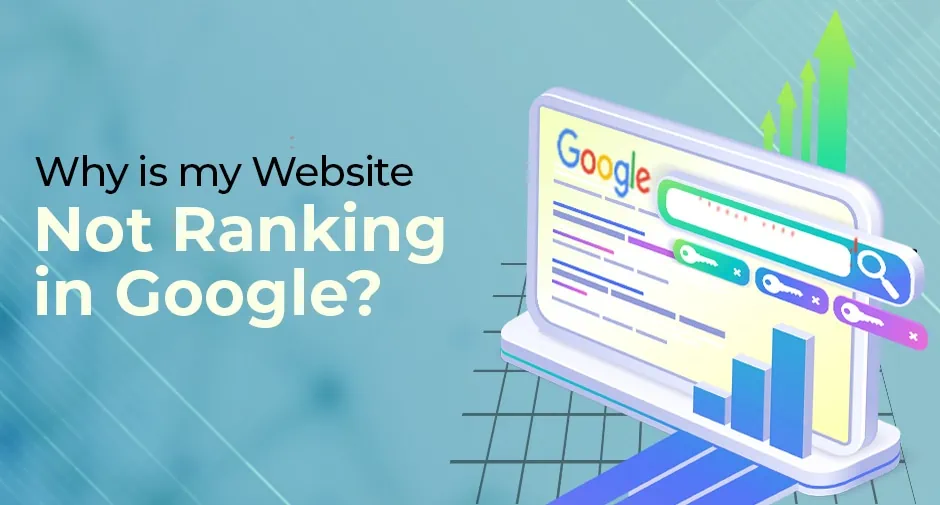If you have built a website, at one point or another, you may have asked yourself, “Why is my website not ranking in Google?” Several factors should be considered to address this question and they are your website’s Domain Authority, Page Authority, content relevance, and overall architecture.
If you’re still wondering why your website doesn’t appear in Google’s search results, then carefully read this article as it provides tips on how to fix this problem.
If your website is not appearing in Google’s search results, and you’re not sure why, several ranking factors could be contributing to its lower placement on SERP.
The first thing that should be checked is relevancy. Google wants to provide the most relevant information to the searcher. This is done by crawling your website content and matching it with the keywords or search terms that users are trying to target.
If your site has copied content from more authoritative sources or you do not thoroughly cover the topic being searched in your content, then it is unlikely that Google will show your website.
Before we explore why your website is not ranking on Google’s Search Engine Results Page, let me define what SERP means.

What is Google SERP
Google SERP is short for “Google Search Engine Results Page.” This is the page that pops up when you conduct a search using the Google search engine. It contains a list of web pages, images, videos, news articles, maps, featured snippets, and other content types that are relevant to the query.
The typical layout of a Google SERP includes organic search results, which are non-paid listings that Google’s algorithm deems most relevant to the user’s query. These results are ranked in order based on various factors, including but not limited to website authority, content quality, and relevance to the search query.
In addition to the organic results, the SERP includes search engine advertising, also known as pay-per-click ads, labeled “Ad”. These are paid-for listings where owners of websites have paid for their websites to appear at the top and bottom of the page.
Different layouts and features on the SERPs of Google include various conditions for different search query types, geographical regions, and more. It aims to serve the most useful results that a user may have in his/her need.
Factors that Influence Google Rankings to Improve Your Position in Search Results
-
Keyword Placement and Density
The placement of keywords in your content is crucial as it helps Google determine what a page is about. Try using your targeted keyword or phrase in the title tag, again at the beginning of the page content, and a few more times throughout. It’s a highly valuable method of SEO!
However, it’s crucial to write your content for human readers, not just for search engines, ensuring that the page flows naturally and is not excessively stuffed with keywords. Keyword stuffing can be perceived as spammy by Google, potentially leading to penalties for your website. The objective is to create relevant signals for Google without going overboard.
You may also like: How to Get on the First Page of Google SERP
Also, take in mind the domain you pick. It is good to have the keyword included in it, and if the one you want is taken then you can always go with having the keyword in a subdomain. You could have a page domain something like this: seo.example.com instead of www.example.com/seo.
Effective optimization could also be done with plugins, like Yoast SEO or Rank Math. These plugins provide guidelines for content readability, keyword usage, image optimization, and other essential parameters for improvement in WordPress.
-
Content and Website Updates
Google highly values fresh and unique content. To maintain the appeal of your website, ensure regular updates by adding new blog posts and making frequent updates. For better signals to Google, consider implementing substantial changes instead of minor ones during updates.
Apart from blog posts and pages, it’s beneficial to create supplementary content that offers value to both searchers and your target audience. Consider including the following:
- Videos
- Infographics
- Interactive Maps/Tools
- E-books, Whitepapers, Downloadable Templates
By incorporating diverse and valuable content, you enhance your website’s appeal to Google and visitors alike.
-
Image Optimization
To help Google web crawlers understand what an image on your webpage means, it’s essential to provide proper information.
Make sure the image filename, alt text, and title tag all describe the image. Ensure these descriptions are short and different, even if your website uses several similar images. It may take some creativity to accurately describe them.
-
Track Website Engagement Duration
When people come to your website and leave immediately – a process called bouncing – Google may take that as a sign that the information on your page is not relevant to the search query that brought them to your site.
To avoid this, make sure your content is engaging and communicates what needs to be said. If people are spending time on your site, it means you’re providing value, and Google will be more inclined to share your website with new users!
You may also like: How to Improve the ROI of Your SEO Strategy
Optimizing Your Website for Improved Google Search Rankings
-
Domain Registration
Keep your domain up to date, and consider longer registrations. Google sees longer registrations as more valid and gives more credibility to the sites they feel will be around for a long period of time.
Domains with shorter-term registrations may seem less authoritative, indicating that the site is not well-maintained or is temporary compared to other established sites on the same topic.
-
Check Domain History
Websites that are ranked low in Google may have some problems with their domain history. Penalties such as Penguin and Panda were created to catch abusive methods to inflate web rankings, which may affect your site.
Beware of hosting your website with spammers or using “black hat” methods. Google will find it sooner or later, and your website will start to drop down the rankings.
-
Check Page Speed
Slow-loading websites tend to rank lower compared to websites that can quickly deliver content. Google wants quality for searchers, and a slow-loading page might just be a signal of poor quality. Besides, customers want speed, and if the page is slow to load, they may just leave your site quickly, thus driving your bounce rate higher.
-
Utilize Link Strategy Tools
There are a number of different tools that can help improve your link strategy. Some of these include the Moz browser extension, Ahrefs, and Screaming Frog SEO Spider.
-
Analyze Backlink Quality
You want to make sure your website is sending all the right signals to Google, which can be measured from your backlink profile. Low-quality or spammy incoming links may signal an attempt at manipulating the ranking system; hence, possible Google penalties may happen to your website.
Link building needs to come naturally. Stronger ratings are actually received when a high trust level of other sites provides your readers with a good resource.
You may also like: SEO Metrics: What are they and why do they matter?
-
Fix Broken Links
Regularly check for and fix broken links on your website, as these send very poor-quality signals to Google and can hurt your site’s visibility across search results.
-
Pay Attention to Internal Linking
Internal linking in your website to other pages of content is just as important to Google. Make sure you have sufficient internal links to other relevant pages of content.
Examples include adding a link to the contact page or adding links to service pages when mentioning services in blog articles.
What if the Keywords You’re Using Are Completely Wrong?
The search volume of your chosen keyword phrases holds immense significance as it forms the foundation of your SEO strategy.
Attempting to rank for a term that only receives 100 searches per month is likely to provide limited chances of reaching the top of the search results page. To maximize your chances of ranking successfully, opt for keywords with relatively high search volumes.
This will be a far easier task than attempting to struggle for positions with less ideal keyword choices. Check and research keywords that people commonly look for on your pages, and structure content on topics relevant to the keyword research.
Your Website Is Not Getting Indexed by Google
SEO is about creating well-represented content, but it means absolutely nothing if no one sees it. You want to make sure people can find your website. There are many ways you can do this, including posting on popular sites and using social media channels. An SEO audit may also be helpful.
You may also like: On-Page SEO Tips for Small and Medium Businesses
It is good that you understand why your website does not rank in Google, but more importantly, you should know what to do as a website owner. Let this be your motivation to learn all that you need to know to get your website ranking in the search engines.
Lack of authoritative backlinks: Backlinks are important for developing your website’s authority in the eyes of Google. Work hard to secure links from high-traffic websites with high authority to transfer the “link juice” to your site.
With the rise in mobile web browsing, optimization for mobile devices has become quite important. Ensure your website is compatible with smartphones and other handheld devices for easy access to all your content.
Citations are vital to Local Search Results
Citations of your business are necessary to give more credibility to your local listing. Google has been releasing algorithmic updates that can affect citations across all sites, including those optimized by citation services or SEO companies.
This is probably because many of these companies will fail to provide consistent information and links back to your site, therefore building trust with Google.
For this reason, the listings may not rank very well compared to an adequately optimized listing. If, therefore, you’ve ever wondered why your website was not ranking well on Google, it might just have something to do with poor citations, and that repair job has just gotten underway.
Google Has Penalized Your Website
Google penalties have been a long-standing concern, with Google using over 200 signals to rank websites, making rankings susceptible to penalties at times. If your site faces a penalty, swift action is necessary before it reappears in search results.
First, there’s a need to be properly informed of the actual reasons for the penalty, and how to fix this, which this blog post is helpful for.
Secondly, Google Search Console has the facility to disavow some links from your site.
There are several factors that could be hampering your website’s rank on Google’s SERPS, and most unfortunately, understanding may not necessarily be able to lead to solutions. However, by diligent research and effort, you can set things on the right track.
Google Algorithm Updates
Google releases updates to the algorithm every year, making drastic changes that can directly affect backlinks, spam links, and even social media. If your website has elements in it that are considered spammy, then it may very well be affected by the next big update from Google.
If your website is not performing well in Google, don’t worry; our digital marketing agency can help. So feel free to schedule a free strategy session and learn more about our proven SEO services.
You may also like: Why Every Growing Startup Needs to Create a Robust Online Presence That With the Perfect Domain Name
Perform a Website Audit to Identify SEO Issues
All of the above factors are considered some of the most influencing factors that will affect your search engine results; remember, Google’s algorithms in their search engine use more than 200 ranking factors. There may be several reasons why your site isn’t ranking.
If you need help in finding those “SEO troublemakers” that are holding your website back from ranking on Google, we are here to help! Get a free website audit from a certified SEO expert.
Would you like to read more about why is my website not ranking in Google SERP-related articles? If so, we invite you to take a look at our other tech topics before you leave!
Use our Internet marketing service to help you rank on the first page of SERP.
![]()











